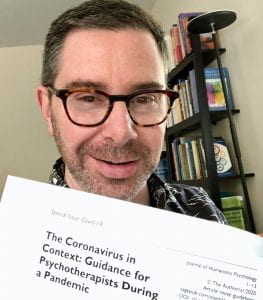Dr. Jonathan Raskin, professor of psychology and counselor education, has co-authored a new article providing guidance for psychotherapists during the coronavirus pandemic. The article applies a context-centered therapy approach to working with clients during these difficult times.
Reference:
Raskin, J. D., & Efran, J. S. (2020). The coronavirus in context: Guidance for psychotherapists during a pandemic. Journal of Humanistic Psychology. Advance online publication. http://doi.org/10.1177/0022167820937509
Abstract:
 We outline a context-centered therapy approach to helping clients cope with the coronavirus pandemic. Context-centered therapy is a constructivist approach that emphasizes shifts in an individual’s contexts as the best way to generate therapeutic change. Contexts are defined as sets of presuppositions that shape a person’s experiences. We examine how two very common contexts, mind and self, can inform therapists’ understanding of how their clients are responding to the coronavirus pandemic. The mind consists of a person’s defensive and protective postures in the face of perceived threat, whereas the self takes a broader perspective and emphasizes human connections and interrelatedness. Therapists can use several mind/self contrasts—blame versus responsibility, insufficiency versus sufficiency, being at effect versus being at cause, and avoidance versus mastery—to assist people who are struggling in the face of the coronavirus pandemic.
We outline a context-centered therapy approach to helping clients cope with the coronavirus pandemic. Context-centered therapy is a constructivist approach that emphasizes shifts in an individual’s contexts as the best way to generate therapeutic change. Contexts are defined as sets of presuppositions that shape a person’s experiences. We examine how two very common contexts, mind and self, can inform therapists’ understanding of how their clients are responding to the coronavirus pandemic. The mind consists of a person’s defensive and protective postures in the face of perceived threat, whereas the self takes a broader perspective and emphasizes human connections and interrelatedness. Therapists can use several mind/self contrasts—blame versus responsibility, insufficiency versus sufficiency, being at effect versus being at cause, and avoidance versus mastery—to assist people who are struggling in the face of the coronavirus pandemic.
